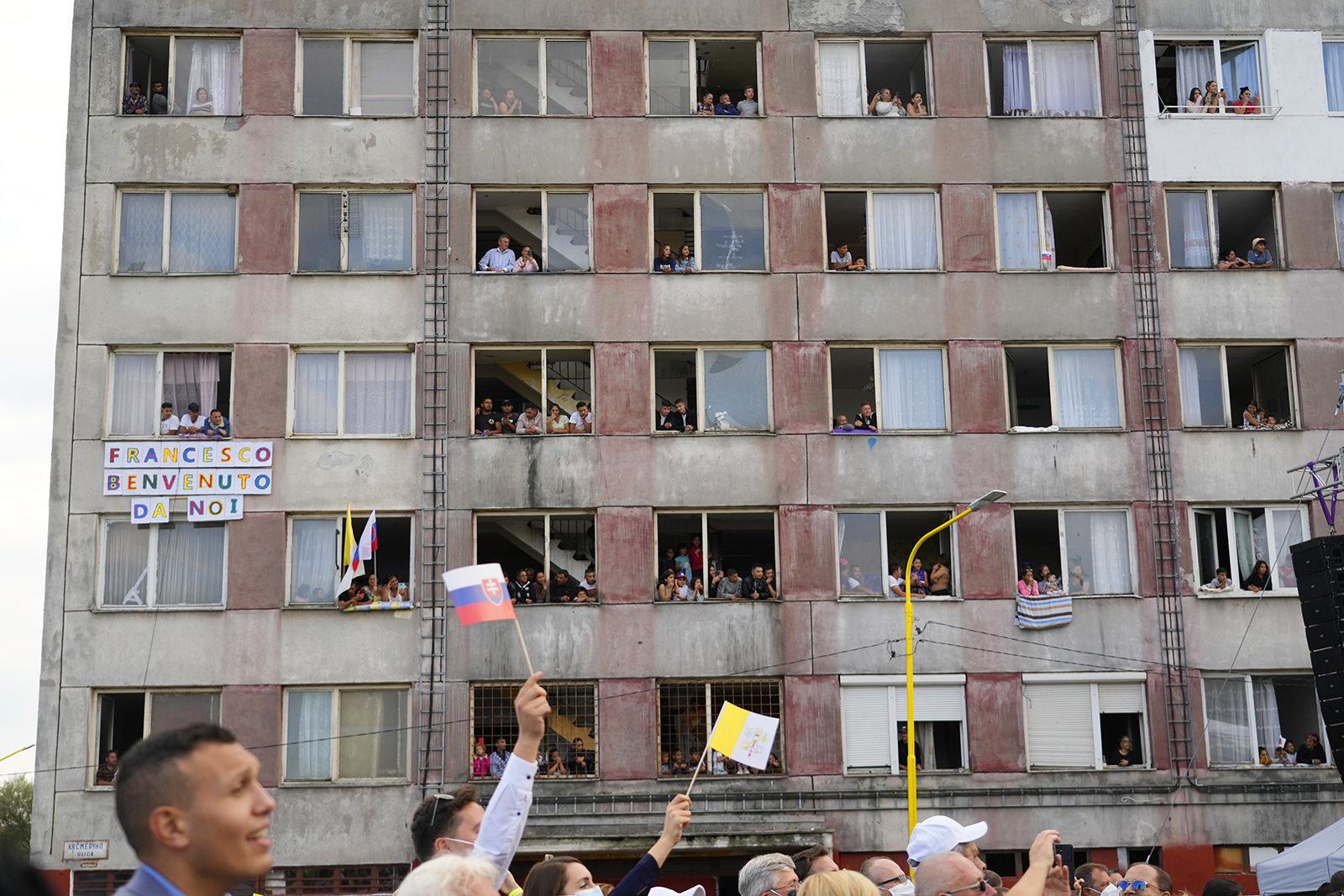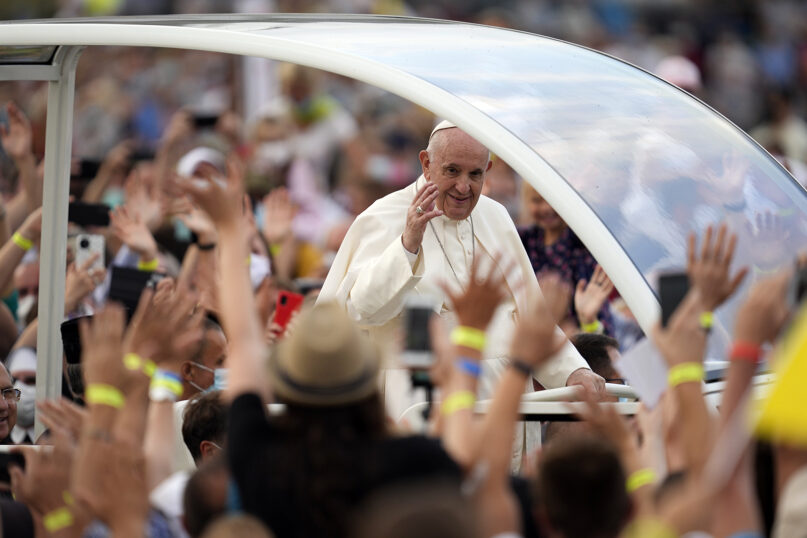VATICAN CITY (RNS) — Pope Francis’ second day in Slovakia centered on young people, encouraging them to embrace love and heroism and not to be discouraged by those who tell them things will never change.
In the large Lokomotiva stadium in the Slovakian city of Košice on Tuesday (Sept. 14), the pope addressed thousands of youth. Despite the evil in the world and the many who are concerned only with themselves, Francis said, “don’t let this affect you.”
“Don’t be dismayed or yield to those who tell you that nothing will ever change,” he added. “Once you start believing that, you will soon yield to pessimism, the sickness that ages us from within; your youth will quickly grow old.”
On the third day of his apostolic visit to Hungary and Slovakia (Sept. 12-15), Pope Francis warned younger generations against the “spreaders of negativity” and “those who appeal to dreams but instead peddle illusions.” He urged them not to give in to pessimism or glumness. “We were not made to be downcast, but to look up to heaven,” he said.
After riding among the faithful aboard his popemobile, Francis listened as three young people described their experiences and asked questions about faith, forgiveness and love. In his speech, marked by a strong pastoral undertone, the pope offered words of advice.
“Today, being really original and revolutionary means rebelling against the culture of the ephemeral, going beyond shallow instincts and momentary pleasures, and choosing to love with every fiber of your being, for the rest of your life,” the pope said.
Responding to the testimony of a young couple, the pope said love is never easy. Like in the great stories told in books and movies, love requires “adventure, heroism,” he said. “If we look to the crucified Jesus, we find both boundless love and the courage to give one’s life to the utmost, without half-measures,” he added.
When it comes to the sacrament of confession, where Catholics ask God for forgiveness of their sins, the pope urged young faithful to not be silenced by their sense of guilt.
“Feeling ashamed is a good sign, but like any other sign, it points to the road we need to follow,” he said. “Don’t let shame imprison you, because God is never ashamed of you. He loves you in the very place where you feel ashamed. And he loves you always.”
RELATED: Pope Francis seeks to set misunderstanding with Jews aside during papal trip
Earlier on Tuesday, the pope also spoke words of encouragement to the largest Slovakian Roma community living in the peripheries of Košice, in the massive public housing complexes of Luník IX. Here, Francis listened to the experiences of the Roma people, who are often marginalized — if not outright persecuted.
“Judgment and prejudice only increase distances. Hostility and sharp words are not helpful. Marginalizing others accomplishes nothing. Segregating ourselves and other people eventually leads to anger,” the pope said.

Residents wait for Pope Francis’ arrival to meet members of the Roma community at Lunik IX, in Košice, Slovakia, Sept. 14, 2021, the biggest of about 600 shabby, segregated settlements where the poorest 20% of Slovakia’s 400,000 Roma live. Pope Francis traveled to Košice, in the far east of Slovakia, on Tuesday to meet with the country’s Roma in a gesture of inclusion for the most socially excluded minority group in Slovakia, who have long suffered discrimination, marginalization and poverty. (AP Photo/Gregorio Borgia)
The only path to peaceful coexistence, Francis said, is the way of dialogue and integration. With “patience and concrete effort” can the road to peaceful coexistence be paved for the future, he added.
“And what is the future? It is our children. The future belongs to them; they are the ones to guide us,” Pope Francis said to the crowd before him and those peeking down at him from the windows of the massive project.
Youth’s “great dreams must not collide with barriers that we have erected,” the pope said, guiding older generations toward integration with the marginalized and motivating them “to make far-sighted decisions.”
“Courageous decisions must be made on behalf of our children: to promote their dignity, to educate them in such a way that they can grow up solidly grounded in their own identity and be given every opportunity they desire,” he added.
Roma people, descended from nomadic tribes in Europe, were heavily persecuted and sent to concentration camps by the Nazis during the Second World War, and Roma remain segregated in most European countries due to the stigma associated with their lifestyle.
“The church is indeed a home; it is your home,” Pope Francis told the Roma community in Slovakia. “Always feel at home in the church, and don’t ever worry about whether you will be at home there. Nobody ought ever keep you or anyone else away from the church!”
In the morning, the pope met with Archbishop Ján Babjak of Prešov, who also is the highest representative of the Greek Catholic Metropolitan Church in Slovakia. After riding with Babjak on the popemobile, the pope presided over the Byzantine liturgy before more than 30,000 faithful.
The cross must not be reduced to ”an object of devotion, nor a political symbol,” Pope Francis said. Whoever wears “the cross in the heart and not only on his neck doesn’t view anyone as their enemy, but everyone as brothers and sisters for whom Jesus gave his life.” Christians bearing the cross must avoid deceit and power, and instead give themselves wholly for others, he added.
“That’s how faith is spread: not with the power of the world, but with the wisdom of the cross; not with structures, but with witness,” Pope Francis said. “And today, the Lord, from the throbbing silence of the cross, he asks all of us, he also asks you, you, you, and me: ‘Will you be my witness?’”
RELATED: Blocked from serving their church, Catholic women push for female deacons





